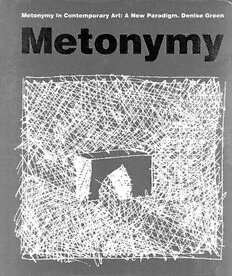Download Metonymy In Contemporary Art: A New Paradigm PDF Free - Full Version
Download Metonymy In Contemporary Art: A New Paradigm by Denise Green in PDF format completely FREE. No registration required, no payment needed. Get instant access to this valuable resource on PDFdrive.to!
About Metonymy In Contemporary Art: A New Paradigm
In Metonymy in Contemporary Art, Denise Green develops an original approach to art criticism and modes of creativity inspired by aspects of Australian Aboriginal and Indian thought. Interweaving her own evolution as an artist with critiques of Clement Greenberg and Walter Benjamin as well as commentary on artists such as Joseph Beuys, Mark Rothko, Frank Stella, and others, Green explores the concept of metonymic thinking as developed by the poet and linguist A. K. Ramanujan and its relevance to contemporary painting and aesthetics. In Ramanujan's formulation of metonymic thinking, the human and natural worlds are intrinsically related to one another as are the transcendent and mundane. When applied to contemporary art, metonymic thinking implies that one must understand that the creativity of the artist flows from a fusion of an inner state of mind and the outer material world. Pointing out how this alternative aesthetic and cognitive mode is left wanting in art criticism, Green argues for a critical discourse and interpretive mode in contemporary art that is at once global and pluralist in perspective. Denise Green is an Australian American artist and writer in New York City. Since 1972 her work has been the subject of over eighty-five solo exhibitions. She has collaborated as an editor for Semiotext(e) and is a member of the Graduate Faculty at the Pennsylvania Academy of Fine Arts in Philadelphia. Her writings have appeared in Arts Magazine, Art Press, Art Monthly Australia, and Art and Australia. Retrospectives of her work have appeared in major museums from the P.S. 1 Contemporary Art Center/Museum of Modern Art in New York to the Art Gallery of New South Wales in Sydney, the Ludwig Museum in Budapest, and the Saarland Museum in Saarbr?cken, Germany. Examples of her work can be found at www.denisegreen.net.
Detailed Information
| Author: | Denise Green |
|---|---|
| Publication Year: | 2005 |
| ISBN: | 9780816648788 |
| Pages: | 137 |
| Language: | English |
| File Size: | 9.695 |
| Format: | |
| Price: | FREE |
Safe & Secure Download - No registration required
Why Choose PDFdrive for Your Free Metonymy In Contemporary Art: A New Paradigm Download?
- 100% Free: No hidden fees or subscriptions required for one book every day.
- No Registration: Immediate access is available without creating accounts for one book every day.
- Safe and Secure: Clean downloads without malware or viruses
- Multiple Formats: PDF, MOBI, Mpub,... optimized for all devices
- Educational Resource: Supporting knowledge sharing and learning
Frequently Asked Questions
Is it really free to download Metonymy In Contemporary Art: A New Paradigm PDF?
Yes, on https://PDFdrive.to you can download Metonymy In Contemporary Art: A New Paradigm by Denise Green completely free. We don't require any payment, subscription, or registration to access this PDF file. For 3 books every day.
How can I read Metonymy In Contemporary Art: A New Paradigm on my mobile device?
After downloading Metonymy In Contemporary Art: A New Paradigm PDF, you can open it with any PDF reader app on your phone or tablet. We recommend using Adobe Acrobat Reader, Apple Books, or Google Play Books for the best reading experience.
Is this the full version of Metonymy In Contemporary Art: A New Paradigm?
Yes, this is the complete PDF version of Metonymy In Contemporary Art: A New Paradigm by Denise Green. You will be able to read the entire content as in the printed version without missing any pages.
Is it legal to download Metonymy In Contemporary Art: A New Paradigm PDF for free?
https://PDFdrive.to provides links to free educational resources available online. We do not store any files on our servers. Please be aware of copyright laws in your country before downloading.
The materials shared are intended for research, educational, and personal use in accordance with fair use principles.

